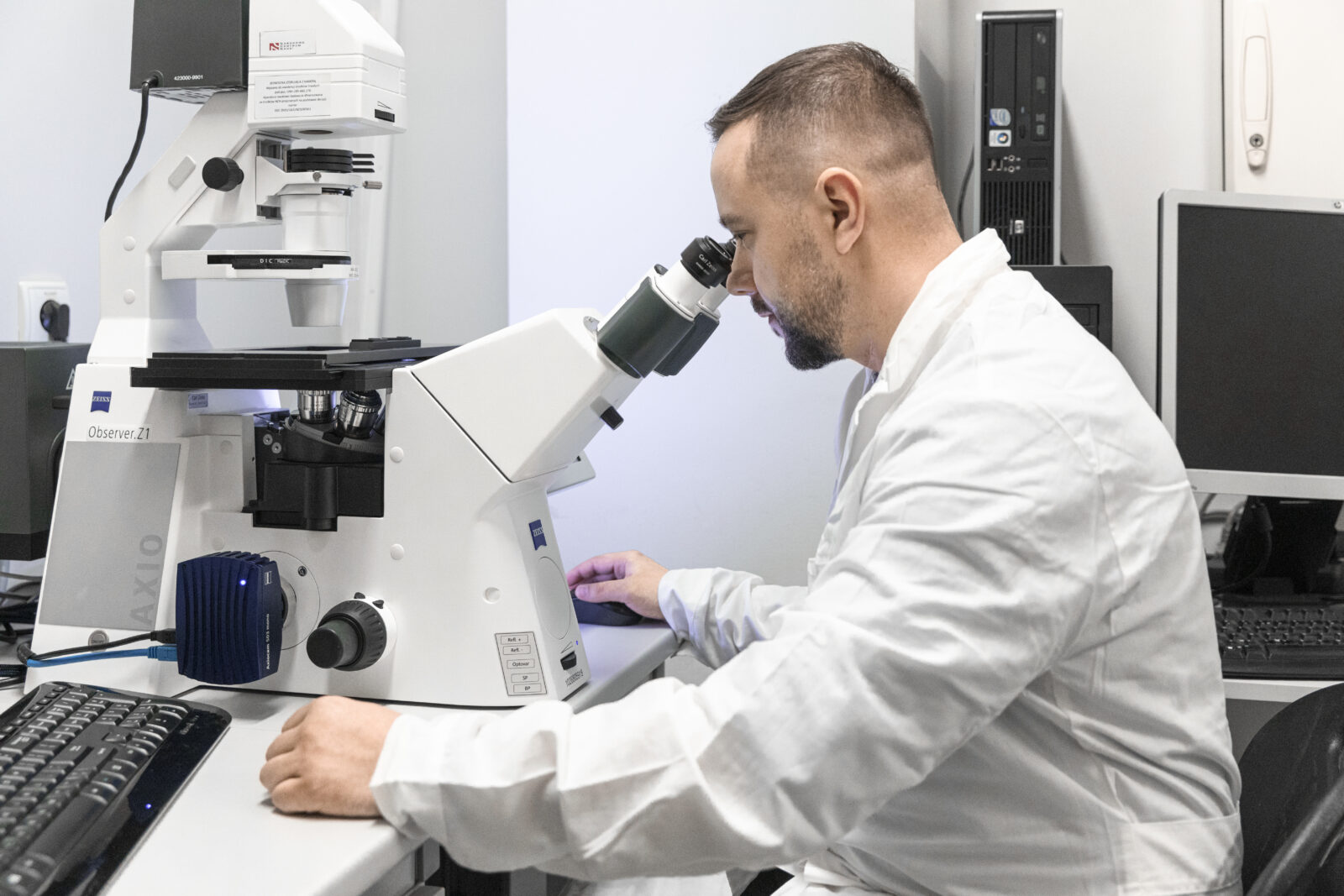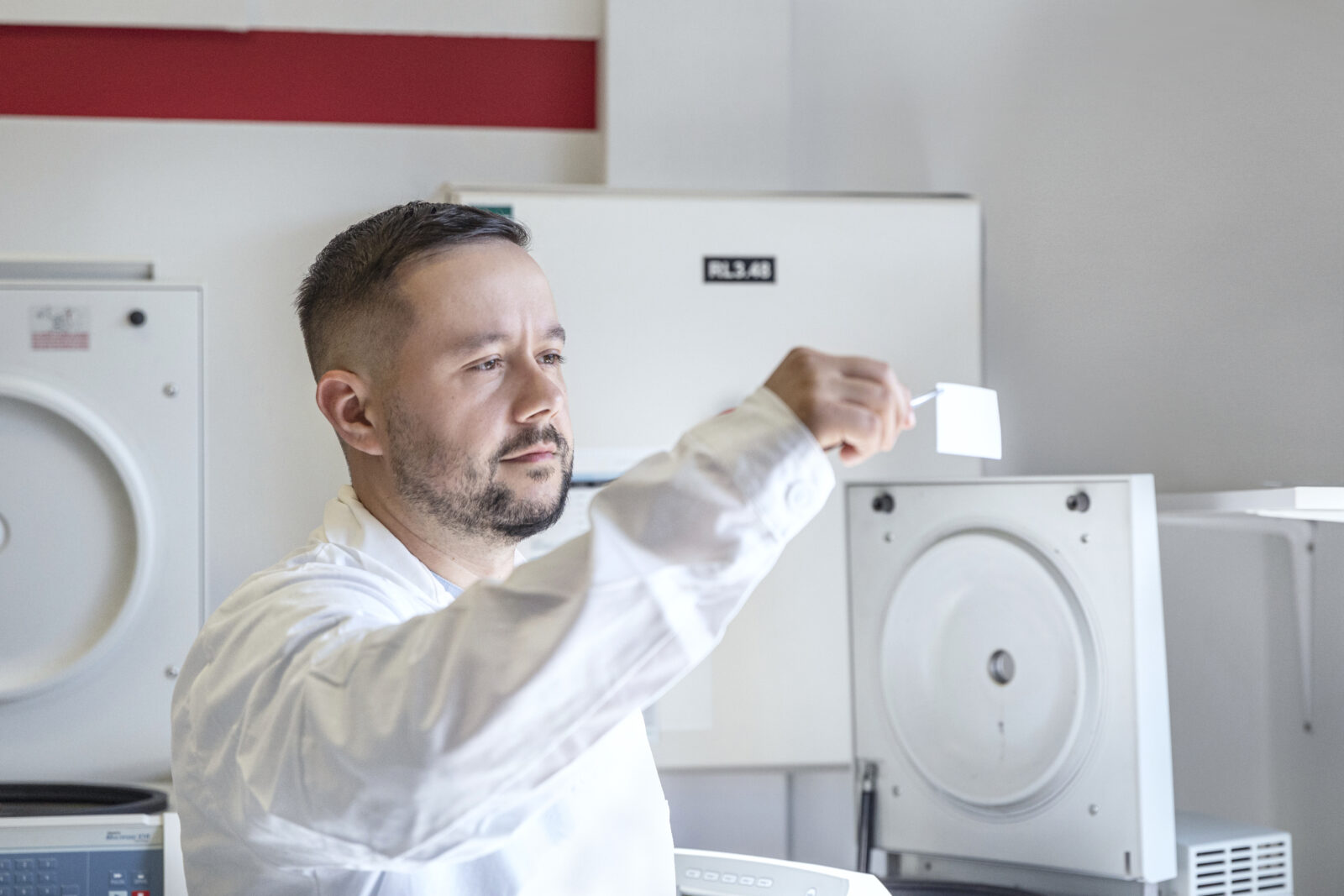
NCN award for prof. Łukasz Opaliński
The winners of the 2023 NCN Prize have been announced. This most prestigious award for young scientists working in Poland finally went to Wroclaw – to prof. Łukasz Opaliński of the University of Wrocław! Congratulations!
The NCN award was presented for the 11th time. This is the first time a researcher from a Wrocław university has been awarded. The award is open to researchers who are under 40 years of age and have significant scientific achievements in basic research, documented by publications affiliated with Polish scientific units. The award is given in three areas of sciences: humanities, social and arts, science and technology and life sciences. The basic criterion used by the chapter evaluating the achievements of candidates is their scientific excellence and international recognition.
This year, the award chapter selected the winners from among 44 candidates. The names were announced at a gala on the evening of October 11 at the Gallery of 19th Century Polish Art in Kraków’s Sukiennice. The winners were dr hab. Katharina Bogusławska (Nicolaus Copernicus University in Torun), dr hab. Łukasz Opaliński (University of Wrocław) and dr Karolina Ćwiek-Rogalska, Institute of Slavic Studies at the Polish Academy of Sciences.
Dr hab. Łukasz Opaliński, prof. UWr from the Department of Protein Engineering, was awarded in the category: LIFE SCIENCES
The title of the scientific achievement for which the NCN Award was awarded is: “Multivalent interactions between fibroblast growth factor receptors and natural and designed ligands for applications in research and medicine”.
What is our researcher working on?
Cells are constantly communicating with each other and responding to changes in their surrounding environment. Proper communication of cells and the constant precise transport of macromolecules that occurs within them is essential for our body to form and for it to function properly. Much of cellular communication is organized in the form of signaling pathways, in which receptors present on the surface of cells recognize the information sent to them, often in the form of other proteins, and, by activating cascades of biochemical reactions, trigger appropriate cellular responses. To prevent receptors from becoming too active, as we see very often in cancers, cells must at some point turn off such activated receptors mainly by transporting them inside the cell (endocytosis) and degrading them.
In his research, prof. Łukasz Opaliński’s team seeks to understand how our cells use Fibroblast Growth Factor Receptors (FGFRs), one of the most important cell surface receptors, to communicate in health and disease. – We are studying how FGFRs become activated and determining the importance of the spatial arrangement of FGFRs on the cell surface for their action and endocytosis, the researcher explains. – We then use the resulting fundamental knowledge to design and manufacture FGFR-recognizing proteins with well-defined features that can serve as highly efficient drug carriers for targeted anticancer therapies.
Due to the importance of FGFRs for human development and health, these receptors have been studied for many years. – At this point, however, our knowledge is mainly limited to how FGFRs are turned on by Fibroblast Growth Factors (FGFs) – says prof. Łukasz Opaliński.
Many aspects of FGFR action, especially the mechanisms of non-standard incorporation (by factors other than FGF) and regulation of FGFR, especially in the context of oncogenic processes, remain unknown. – We will be conducting research in this direction in the near future, and I hope that it will lead to further important discoveries, which will ultimately serve to develop new anti-cancer therapies. – adds prof. Opaliński.
Galectins, identified by our researcher’s team as new partner proteins and activators of FGFR, play a very important role in tumorigenesis and immune processes, probably acting through various cell surface receptors. – In the near future, we will want to identify new signaling pathways supervised by galectins. – announces prof. Opaliński.
Galectins have a number of extremely interesting activities from a biomedical perspective as well. By using the expertise our researchers have, they plan to reprogram naturally occurring galectins to exert the effects we want on cells.
And in the future, prof. Opaliński’s team would also like to advance its research interests in terms of targeted anti-cancer therapies. Antibody Drug Conjugates (ADCs) of proteins with cytotoxic drugs are an extremely fast-growing branch of biomedicine. As of this moment, 15 ADCs are already being used to treat various types of advanced cancers, and about 200 are in clinical trials. ADCs, thanks to their design and specific mechanism of action based on specific recognition of cancer cells and endocytosis, are able to “track” even single cancer cells scattered throughout the body. The ADCs used so far involve the use of antibodies with a naturally bivalent (bivalent antibodies are capable of binding two antigens simultaneously) architecture. – Our research and the results of several other research groups around the world suggest a key advantage of using antibodies/ligands with a multivalent architecture, capable of simultaneously binding more receptor molecules, in ADC. – says prof. Opaliński. – In the near future, we will focus on the design of new multivalent cytotoxic conjugates and fabricate multivalent drug carriers with new architectures. We will also investigate how endocytosis of such multivalent conjugates is regulated in the cell to rationally modulate the efficiency of drug delivery to cancer cells.
Dr hab. Łukasz Opaliński, prof. UWr is a graduate of the University of Wrocław (majoring in biotechnology). He received his PhD in 2012 from the University of Groningen in the Netherlands. He completed 2.5-year postdoctoral fellowship at the University of Freiburg in Germany. In 2015, he returned to the Department of Protein Engineering at the Faculty of Biotechnology of the University of Wrocław. He received his postdoctoral degree in 2019 and was hired as a UWr professor in 2022.
His research focuses on cellular mechanisms of signal transduction and protein transport. He has authored 49 publications in leading Philadelphia-listed journals (“Nature Communications,” “EMBO Journal,” “PNAS,” “EMBO Reports,” “Molecular Cell,” “Cellular and Molecular Life Sciences,” “Journal of Biomedical Science,” “Biotechnology Advances,” or “Molecular Oncology”) cited a total of more than 1,400 times.
He has received a grant from the European Organization for Molecular Biology, FUGA, SONATA BIS and OPUS grants from the National Science Center, a prestigious First TEAM grant from the Foundation for Polish Science and a scholarship from the Ministry of Science and Higher Education for outstanding
young scientists. In 2020, he received the Prime Minister’s Award for or highly commended scientific achievements that are the basis for the conferral of a postdoctoral degree. So far, he has promoted 2 PhD students (with distinction; both received the prestigious START scholarship from the Foundation for Polish Science) and is currently the supervisor of 5 doctoral students.
Prof. Opaliński’s team includes a number of distinguished scientists, including dr Natalia Porębska.
Considering the amount of NCN applications qualified for funding in 2011-23 (i.e., about 490 million PLN), the University of Wroclaw ranks fourth place in the country after UJ, UW and the University in Poznań.
*************************
In November and December, NCN Award winners will give popular science lectures, which will be broadcast on the You Tube channel of the Copernicus Center for Interdisciplinary Research in the series “Science at the Center“.















